Related Story: ‘Sweet sixteen funeral’ planned for White teenage girl groomed, killed, and stuffed in dumpster by suspected Black sex-offender
DeKalb, Illinois – It’s been a sobering eight months since the horrific murder of a young White girl rocked a small midwestern town. While the suspect has been caught, those who knew the victim are now demanding more be done to prevent tragedies like this from happening again in the future.

On May 4th, 2023, 15-year-old Gracie Sasso-Cleveland was smothered to death with a pillow. Her body was found days later inside a communal dumpster of an area apartment complex, putting an end to a 3-day manhunt for a missing girl. The suspect, a convicted Black sex offender, was 29-year-old Timothy Doll, a man who was already walking free from a sex abuse conviction with a different minor in 2020.
Court documents alleged Doll called paramedics after he pulled his back, lifting Gracie’s dead body into the trash can.
Gracie’s death has since sparked an outpouring of support from the local community, with some even forming protests demanding harsher penalties for criminals convicted for the abuse of women, children, and other vulnerable people. Bethany McCall, a local victim’s advocate, has been following every detail of the case since it unfolded. Unlike other murders she’s researched, however, McCall explained that this one hits differently.
Gracie would babysit her son, and the two were close, personal friends.
“Doll is in jail with no bond. They are still waiting for fingerprints to come back from the laundry basket they found in the dumpster,” she explained to the Justice Report in an exclusive one-on-one interview. “Doll was (recently) found unconscious in his cell for diabetes…In his cell, they found ‘sorry notes’ to Gracie, which have now been included as evidence.”
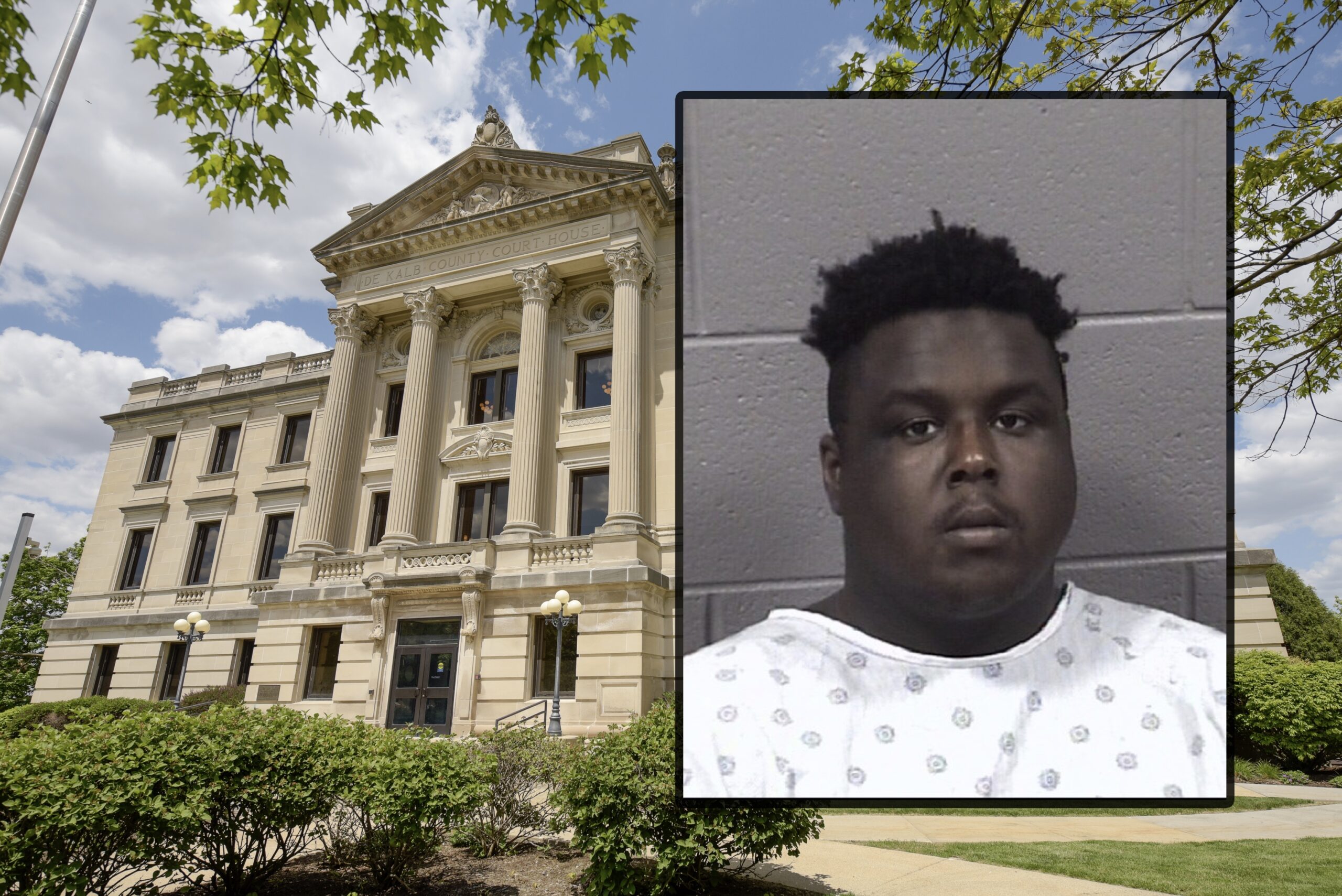
“I don’t think he’ll go to jail for good. I think, if anything, he might get killed in jail, possibly, for what he’s done,” she continued.
Joining McCall in the interview was Mike Rowland, another local close to Gracie, who gave his view on the situation. According to him, Doll was in a “slow class” in high school, which may play a part in his courtroom defense later in the year.
“That dude Doll was in a special education class. He was in a slow class,” he said. “But there were other addicts and sex offenders (in Gracie’s life.) There was grooming going on and all kinds of (negative) influences.”
While the suspect behind Gracie’s murder is currently in custody, those who knew Gracie are not satisfied. To them, her abuse, sex trafficking, and eventual death would have never happened, if not for the years of apparent neglect she experienced at the hands of her own family.
“She was a sweet girl. There was a lot of neglect that was going on… Every single last adult in her life that she should have been able to trust failed her,” said Rowland.
“Her mom thought she was with her dad. Her dad thought she was with her mom,” added McCall. “The neglect was literally going on for all of Gracie’s life.”

With a unique perspective into the life of the victim, McCall and Rowland were able to confidently paint a picture of a young girl who grew up inside a broken home. Suffering from serial neglect, transient housing, human trafficking—and in some cases, drug abuse—the pair of advocates asserted that it was a sheer lack of parental oversight that may have led Gracie into a life of sexual servitude by a convicted Black sex offender.
“Gracie picked me out as someone who could (provide) a safe place. For food, a shower, and everything that should have been provided at her mom’s house. She called me Uncle,” said Rowland.
“Gracie was not allowed to stay at (her mom’s) apartment. She was not allowed to stay the night there, and when she did, she would have to pay rent and give all her paychecks to her mom and her current boyfriend,” said McCall. “She would have to sleep on the couch in the living room.”
McCall, a mother herself, had a close relationship with Gracie and maintained regular contact via text messages and phone calls. Sensing something was going on in the home long before her death, McCall would be one of several others—including Rowland—who would step in and help provide care for the 15-year-old, sometimes providing basic necessities like laundry access, spending cash, or even a ride around town.
“She always needed food, always needed laundry, always needed a ride. I’m not sure what (her family) provided for her,” said Rowland.

After Gracie was murdered, it was McCall who set up a much-needed GoFundMe page, which ultimately raised almost $10,000 for the cost of a funeral. But the road to that financial success wasn’t easy. According to McCall, she found a stumbling block in the form of Gracie’s own mother, Ericka Sasso.
“We raised over 10 grand in total. Ericka reported (the GoFundMe) as fraudulent. Eventually, (the funds) were released to the funeral home after all this drama and these rumors,” she explained. “I think for the amount we raised, it didn’t cover near what we should have for Gracie.”
When asked why her mother would do such a thing, McCall explained that her daughter’s funeral had to be “all about her.”
“(Ericka) wanted it to be all about her. She said I didn’t have permission to raise money for Gracie, but I did from Gracie’s aunt and grandmother,” she continued. “They had no idea what was going on, they just knew she was missing. I was the one to tell them that Gracie was found dead in a dumpster because they couldn’t ever get a hold of her mom.”
“I wasn’t (invited to Gracie’s funeral.) I planned a memorial two days after she was found. I had all these ribbons and stickers printed out, and a bunch of people showed up, and I couldn’t even go there because my life was threatened,” said McCall, alleging that threats from strange people would regularly appear since she started advocating for Gracie. “I had to be escorted by police to pay my respects. I only spent like 30 seconds up there.”
The situation appeared bleak, but the pair explained that if anyone tried to provide Gracie with lasting support, they’d face similar roadblocks. Rowland believed stubbornness and denial were the root issues, calling it the “addict mindset.”

“If you did try to step in and intervene, either the school or (her mother) shut it down…Ericka would say: ‘No one is going to help my daughter. If you have something better to offer her than I do, you’re not going to help her,’ and that’s what killed her,” he said.
Rowland and McCall then made a staggering allegation that most of the neglect and abuse Gracie had suffered at home stemmed from her mother’s long battle with a debilitating case of drug addiction.
“The last time I saw (Ericka), she looked extremely healthy; it looked like she had gained about 30 lbs,” said McCall. “She looked like the old sober Ericka that I knew. I find out two days later that she was arrested for crack.”
While the claim was serious, McCall explained that she knew all the tells and signs of substance abuse when she saw it. As someone who had suffered from the woes of addiction—but was now living sober and in recovery for some time—McCall instinctually knew Ericka’s close proximity to things like crack cocaine could only spell disaster for those around her, including Gracie.
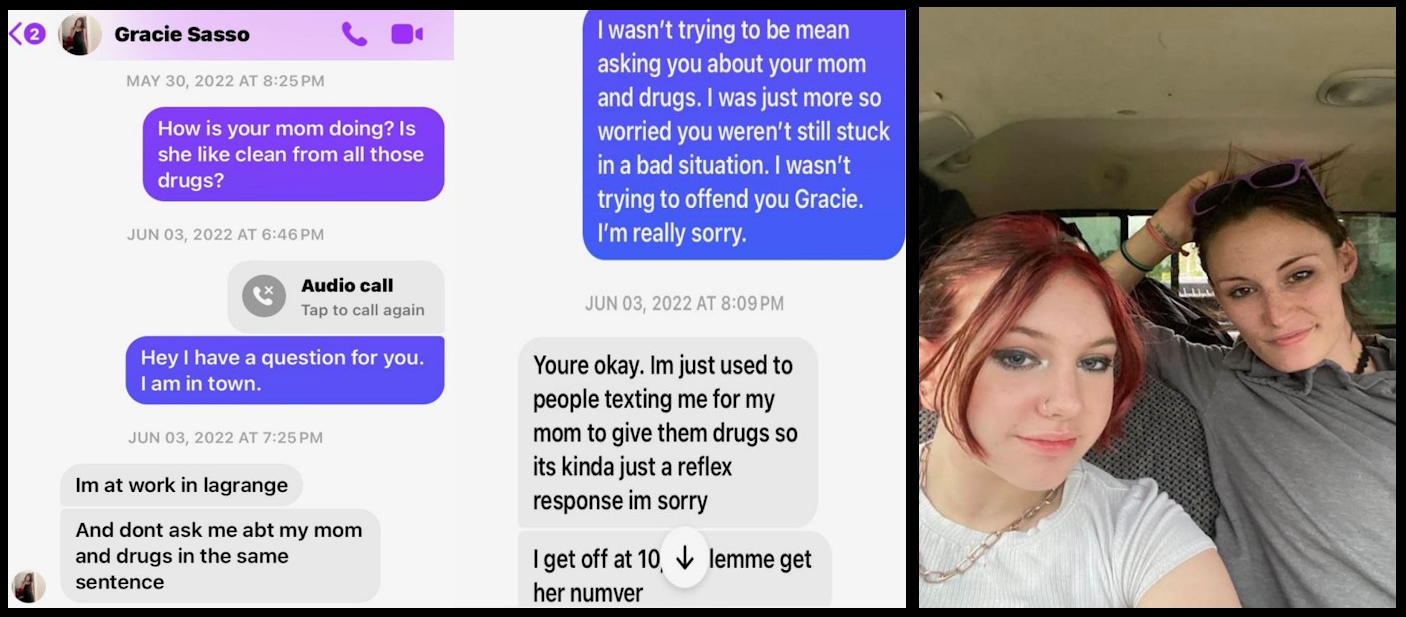
“Even if she wasn’t smoking it, she’s still around it. It’s hard to go through the death of your daughter, the murder of your daughter, and to be around (crack) and not do it,” alleged McCall.
Following the allegations, the Justice Report reviewed a series of texts sent to McCall by the late Gracie Cleveland-Sasso, which appeared to be genuine. In them, Gracie explains to McCall that it’s common for people to text her as a means to get her mother, Ericka, to “give them drugs.”
“I remember going to Gracie’s house one time, and Gracie was sitting in her room by herself, and Ericka was in the back smoking crack like a crazy person. I checked in on Gracie and she was sitting there looking so sad,” said McCall.
“All the men that Ericka allowed around Gracie were grooming her,” added Rowland. “It seemed like human trafficking. More attention should be put on the people that Ericka allowed in Gracie’s life, and those people were pieces of s–t.”
The Justice Report reached out to Ericka Sasso for comment on the allegations via social media but did not hear back in time for a response.
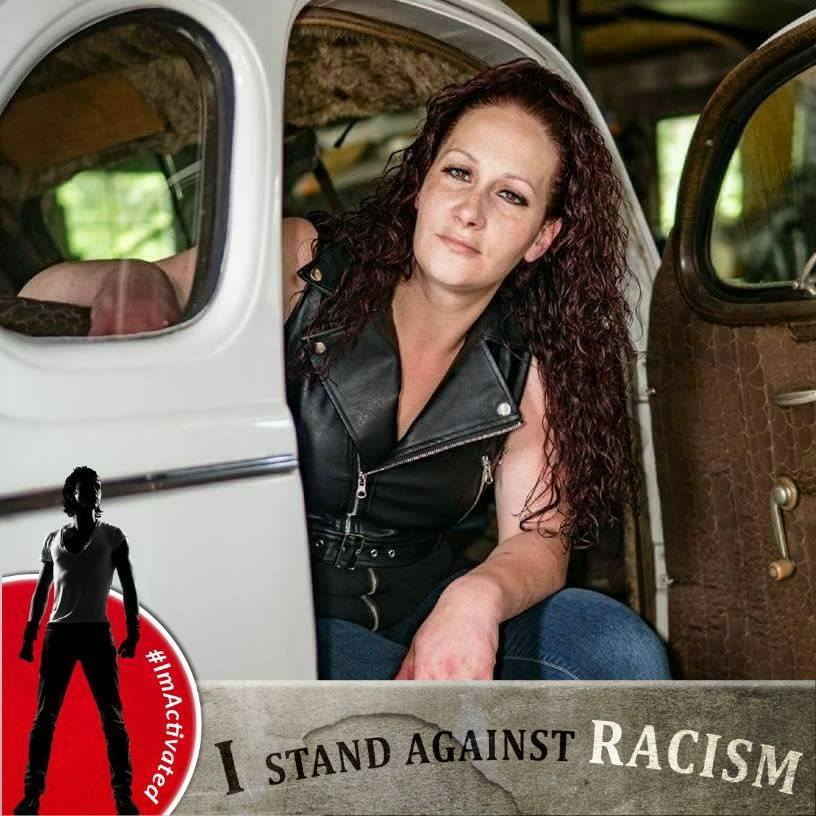
In the end, McCall and Rowland explained that Gracie’s relationship with her alleged killer would be the result of a 15-year-old girl with nowhere else to turn to. But even with Doll, her torture only increased, and McCall explained that under his care, Gracie would be forced to sell explicit photos to willing pedophiles online.
“(Doll) made her text guys sexually and send pictures of herself to get money for him,” she alleged.
The claim would not be off the mark. According to reports, Doll—in addition to murder—currently faces a charge of aggravated criminal sexual abuse, which would corroborate the story. According to the Illinois sex offender registry, Doll pled guilty to the same charge in January 2020 with a different minor, this one only 14 years old. For that crime, he was sentenced to 2 1/2 years behind bars, 30 months of probation, and was forced to register as a sex offender in the state of Illinois. He completed the prison sentence under house arrest with GPS monitoring, however, and managed to side-step incarceration.
Despite being prohibited from having contact with minors under the previous conviction, prosecutors say Doll violated the terms of his probation once he entered into an illicit relationship with the 15-year-old Gracie.
“Gracie said that (Doll) introduced himself to her as ‘Terrance Lightfoot.’ I remember that name over two years ago messaging me on Facebook,” said McCall. “I remember that name messaging me a lot so, he went by other names.”
When asked if she believed Doll used Facebook to target impressionable White women, including minors, for sex, McCall nodded her head and said “yes.” She would then state that the best way to prevent abuse and neglect from happening is to speak up if and when you see it.
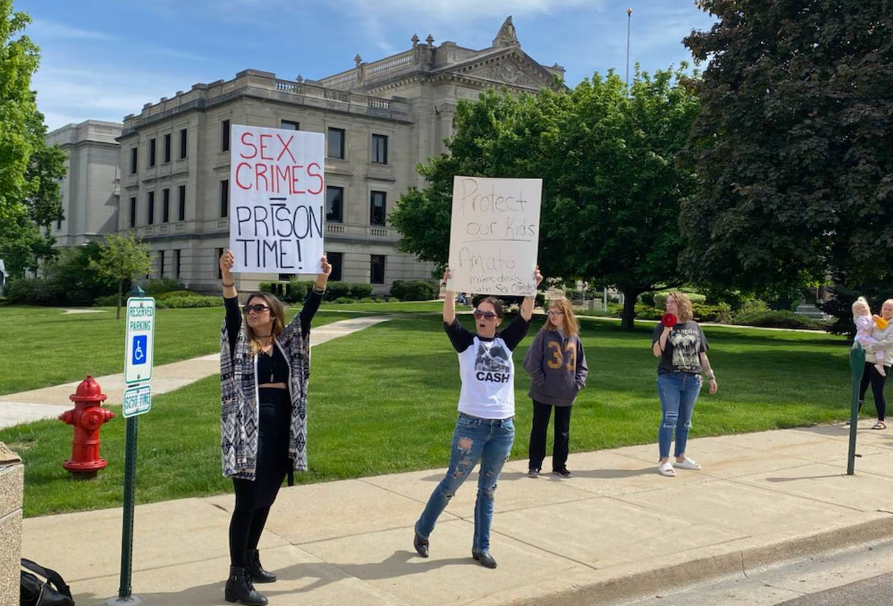
“I think whether you’re a juvenile friend (of a victim) or someone that knows what’s going on, that you should speak up because you don’t know what might be going on behind closed doors,” she said of Gracie’s home life and abuse. “So much could have been prevented. They knew (Gracie) was being neglected.”
Drugs and the consequences of their unrestricted use have often been described as an “epidemic” in the United States, affecting American families from coast to coast. According to a 2023 KFF poll, most adults in the United States have a family or personal connection to someone who is experiencing drug addiction, which includes alcohol.
Of those polled, 42% say it’s had a “major impact” on their relationship with family, 32% believe it’s made a “major impact” on their overall mental health, and 29% say it’s made a “major impact” on the family’s financial situation.
In 2022, drug overdose deaths hit an all-time high, with White, rural, and suburban areas feeling the greatest impact compared to urban, non-White areas. While the invention of life-saving measures like Narcan is believed to have slowed the rate of reported overdoses, addictions and their effect on innocent families remain long after the drug is administered.

Despite being a small, midwestern town, DeKalb, Illinois, has long suffered from the ill effects of America’s ongoing drug epidemic, including crime and other tragedies often conflated with substance abuse. In September, a three-year investigation by a coalition of law enforcement agencies—including the FBI—resulted in the arrest of 5 area men believed to be responsible for a rash of drug-related crimes throughout DeKalb and its neighboring towns.
In June of 2022, undercover cops arrested a Black gunman in a sting after they solicited him for drugs. In that same year, a Black drug dealer was charged for selling fentanyl-laced drugs to a DeKalb man the night before he succumbed to a deadly overdose.
That incident was right on the heels of a similar 2021 incident, where two people were charged with homicide for the same crime, which police allege caused the overdose death of a different DeKalb resident. Even in 2017, drug criminals loomed like a specter over DeKalb after a sweep of dealers by DeKalb police resulted in the arrest of seven people.
The list goes on and on. To make matters worse, criminals brought in under non-violent drug charges in Illinois are often difficult to keep in custody. On September 18th, 2023, the state of Illinois passed legislation that completely eliminates cash bail, allowing pre-trial defendants a chance to walk free and, in some cases, re-offend. Carrying out those arrests is a taxpayer-funded police force, which, thanks to Illinois governor JB Pritzker, could now be staffed by non-citizen migrants from third-world countries.
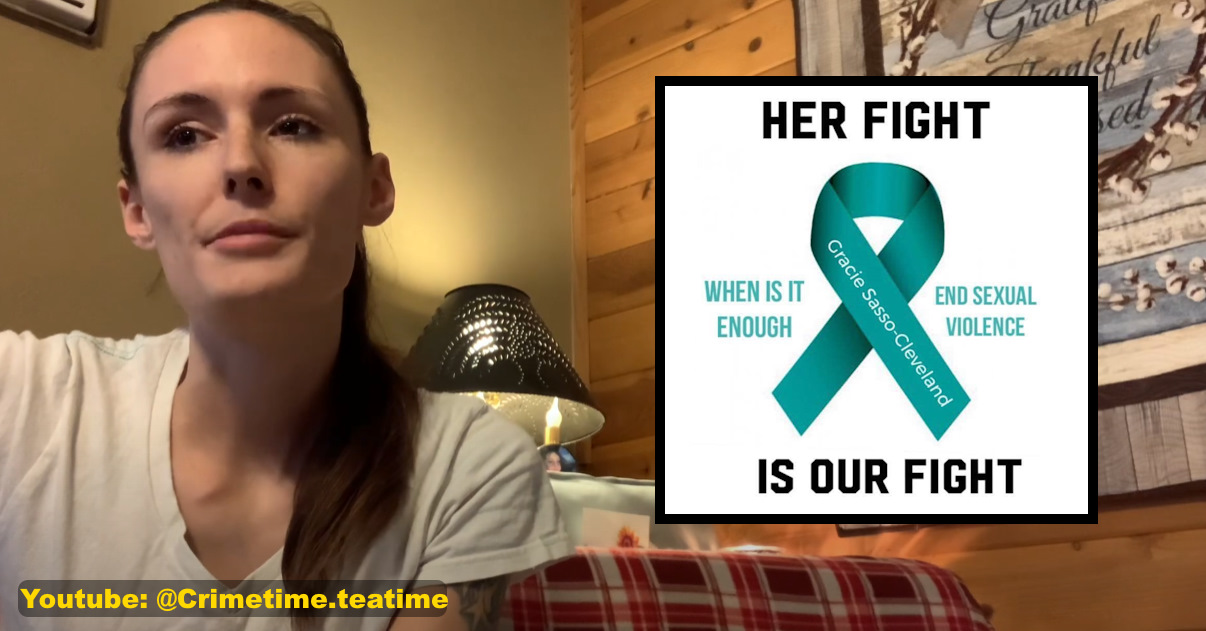
“DeKalb has Northern Illinois University, so it’s more like a college town,” explained McCall. “It’s like a party town. There are lots of robberies and stabbings and shootings.”
Despite its myriad of problems, the town of DeKalb remains the home of thousands of innocent, working-class people. With new victims of crime appearing as quickly as they are forgotten, people like Rowland and McCall say they’ll stand up to be their biggest advocates no matter what.
“I’m not trying to rattle anyone or piss anyone off…I just want justice for Gracie,” said McCall. “She was fifteen years old. She was groomed and neglected her whole life. It’s a sad story. She was like a sister to me. She deserves justice, not just from Doll, but from anyone who indirectly caused her death.”
Despite their tender age, White children often become the unwitting victims of violence at the hands of non-White criminals. In April, a 6-year-old White girl and her father were targeted in a hate-based attack when police said a Black man opened fire on them with two handguns in Gastonia, North Carolina. Throughout the gunfire, the victim said the suspect shouted he “didn’t like White people.”
Bethany McCall is the host of CrimeTimeTeaTime, an irregular podcast covering crimes, and the victims of crimes, in the Illinois area and beyond. She can be found on Youtube, and Spotify.













